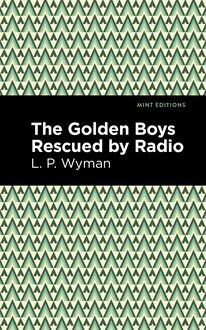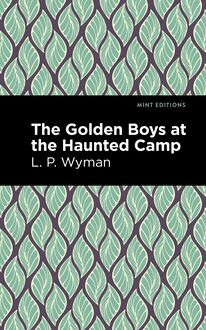-
 Univers
Univers
-
 Ebooks
Ebooks
-
 Livres audio
Livres audio
-
 Presse
Presse
-
 Podcasts
Podcasts
-
 BD
BD
-
 Documents
Documents
-
- Cours
- Révisions
- Ressources pédagogiques
- Sciences de l’éducation
- Manuels scolaires
- Langues
- Travaux de classe
- Annales de BEP
- Etudes supérieures
- Maternelle et primaire
- Fiches de lecture
- Orientation scolaire
- Méthodologie
- Corrigés de devoir
- Annales d’examens et concours
- Annales du bac
- Annales du brevet
- Rapports de stage
La lecture à portée de main
Vous pourrez modifier la taille du texte de cet ouvrage
Découvre YouScribe en t'inscrivant gratuitement
Je m'inscrisDécouvre YouScribe en t'inscrivant gratuitement
Je m'inscrisEn savoir plus
Vous pourrez modifier la taille du texte de cet ouvrage
En savoir plus

Description
The Golden Boys Rescued by the Radio (1923) is an adventure novel by L.P. Wyman and one of seven books in his vastly underrated—and relatively unknown—Golden Boys series.
Each novel follows the adventures of Bob and Jack Golden, brothers from Maine with curious minds and adventurous hearts. Together, often alongside their trusted friend Rex Dale, the Golden Boys use their problem-solving skills and wilderness experience to overcome danger, discover strange places, and grow into fine young men.
While fishing on a lake near their family cabin in the woods of northern Maine, brothers Bob and Jack Golden encounter a strange man with an accent. Curious—and a little worried—at first, the boys return to the peace of the great outdoors for a few more hours. That night, however, a man tries to break into their cabin, and after scaring him off with a gun the brothers wait until morning before making their way home to Skowhegan. There to meet them on their arrival is revenue officer Jim Carson, who is desperate for help on a case involving bootleggers from Canada. Eager to get to the bottom of the previous night’s mystery, as well as to put their newly invented radio to the test, the Golden Boys agree to help Jim. The ensuing adventure, which involves a vanishing cabin, daring rescues, and abundant danger, the Golden Boys will need their wits about them, as well as to use every skill they can muster. With its brilliant blend of detective and adventure fiction, L.P. Wyman’s The Golden Boys Rescued by the Radio is an absolute thrill ride from start to finish.
L.P. Wyman’s The Golden Boys Rescued by the Radio is the work of an inventive author, and is both easy to read and difficult to put down. Published several years before the debut of The Hardy Boys series, which would dominate young adult fiction for decades to come, The Golden Boys series is long overdue for the attention and appreciation it deserves. Although originally published for an audience of teenage boys, Wyman’s series is perfect for children of all ages and genders, as well as for adults looking to return to the simple, exciting fiction of their youth.
With a beautifully designed cover and professionally typeset manuscript, this edition of L.P. Wyman’s The Golden Boys Rescued by the Radio is a newly unearthed classic of young adult literature reimagined for modern readers.
Sujets
Informations
| Publié par | Mint Editions |
| Date de parution | 01 décembre 2020 |
| Nombre de lectures | 0 |
| EAN13 | 9781513268040 |
| Langue | English |
| Poids de l'ouvrage | 2 Mo |
Informations légales : prix de location à la page 0,0450€. Cette information est donnée uniquement à titre indicatif conformément à la législation en vigueur.
Extrait
The Golden Boys Rescued by Radio
L.P. Wyman
The Golden Boys Rescued by Radio was first published in 1923.
This edition published by Mint Editions 2020.
ISBN 9781513265940 | E-ISBN 9781513268040
Published by Mint Editions®
minteditionbooks.com
Publishing Director: Jennifer Newens
Design & Production: Rachel Lopez Metzger
Typesetting: Westchester Publishing Services
C ONTENTS I. T HE P OCKET R ADIO II. T HE V ANISHING C ABIN III. B OB HAS AN A DVENTURE IV. A ND IS C AUGHT V. B OB G OES TO S LEEP AND THE C ABIN V ANISHES A GAIN VI. B IG T INY VII. T HE C HASE VIII. B IG M OSQUITOES IX. T HE P OCKET R ADIO S AVES B OB ’ S L IFE X. B OB HAS A H UNCH XI. T HE G ROUND O PENS AT THE R IGHT T IME XII. P LANS XIII. H I S TONE XIV. J ACK T AKES TO THE A IR XV. T HE M YSTERY S OLVED . C ONCLUSION
I
T HE P OCKET R ADIO
“ T here, that’s done. Got that condenser ready, Jack?”
“I’ll have it in a jiffy, Bob. The wire’s come unsoldered and I’ve got to fix it but it won’t take but a minute.”
“All right, but make it snappy. I’m on pins to know whether the thing’s going to work.”
The two boys, Bob and Jack Golden, aged nineteen and eighteen respectively, had been hard at work for nearly three weeks in their laboratory in the basement of their home in Skowhegan, Maine, a small town some hundred miles north of Portland, on the Kennebec River. It was now nearly ten o’clock at night and they had been hard at work since early morning in an endeavor to bring their labors to an end before going to bed.
“There, she’s fixed,” Jack declared, with a sigh of relief as he placed a small soldering iron in its place over the work bench.
“Good. Now you take your set up to the bedroom and we’ll give it a try out. If it only works, it’ll be the best thing we’ve ever done, Jack boy,” and Bob threw his arms about his brother’s neck and gave him a hearty hug.
“Save the pieces,” Jack laughed as he turned to the bench and picked up a small wooden case which he slipped into his coat pocket. Then from a small drawer he took a brass cylinder about seven inches long and slightly over an inch thick. Caps, which had the appearance of silver, but were composed of an alloy, the secret of which was known only to the two boys, closed the ends of the cylinder. Some three feet of fine wire was soldered to the center of each cap. From the same drawer he took a small round object closely resembling the ear piece of a head telephone.
“I’ll call you in about ten minutes,” he said as he started toward the door. “That is, I’ll try to,” he added turning with his hand on the knob.
As soon as his brother had closed the door Bob set to work assembling his outfit similar, in all respects, to that which Jack had taken with him. The small wooden case he put in an outside coat pocket pushing the two wires which led from it through the lining of the coat. These he quickly attached to the brass cylinder which he then slipped into his inside pocket. The little telephone receiver, which was designed to serve as a transmitter as well, he connected by two wires to the two terminals at one end of the case and slipped it into the same pocket. As he stood there there was nothing visible about him to indicate that he carried on his person their latest invention.
“There, I guess there’s nothing more to do except wait,” he said aloud as he sat down in a chair.
While he is waiting will be as good a time as any other to introduce the two boys to any who have not read the previous volumes of this series.
Bob and Jack Golden were sons of a well-to-do manufacturer and lumberman, Mr. Richard Golden. Their home was in the little town of Skowhegan on the Kennebec River. The boys, being of an inventive turn, their father had fitted up for them, in the basement of the home, a combined workshop and laboratory. Here they spent many hours of their vacations and more than one useful invention had resulted from their labors. The most important was undoubtedly an entirely new type of storage cell. This cell, though small enough to be carried in the pocket, was yet powerful enough to run a motor boat or an automobile for a long time.
“It’s about time I was getting that call,” Bob thought as he glanced at his watch for the tenth time since Jack had left. “It’s been more than ten minutes. Guess I’d better go up and see what’s up.”
But just as he started to rise from his chair a faint but distinct buzzing sound caught his ear.
“There he is now,” he thought as he quickly pulled the receiver from his pocket and held it to his ear.
“Hello, Bob. Can you hear me?” The words were as distinctly audible as if his brother had been standing at his side.
“Fine,” he replied holding the small receiver, which, by pressing a button on the side of the case, he had converted into a transmitter, a few inches from his mouth. “It seems to work all right at this end. Can you hear me?”
Pressing the button again he held the receiver to his ear once more.
“Plain as day,” came the delighted voice of his brother. “I’ll be down in two shakes of a dog’s tail.”
Bob had hardly disconnected the wires and taken the case and cylinder from his pockets when Jack burst into the room.
“Whoop la, she’s a go all right,” the younger boy shouted as he caught hold of his brother and for a moment the two delighted boys executed an Indian war dance about the room.
“We’d better not make too much noise,” Bob cautioned as out of breath he threw himself into a chair. “I expect the folks are in bed by this time and they may think the house is on fire,” he laughed.
“But to think that we’ve hit it at last after trying more than twenty different things,” Jack declared as he too sat down. “It seems too good to be a fact, but those selenium plates are evidently just the thing. They catch the waves just as well and perhaps better than aerials.”
“They seem to is right,” agreed more cautious Bob. “But remember we’ve tried them for only a comparatively few feet. How they will work at a long distance is another question.”
“Of course that’s so,” agreed Jack thoughtfully, “but, for the life of me, I can’t see why they won’t catch them just as well at a long distance as at a short. Anyhow we’ll know before long. I’ll take my bike and go up to the lake first thing in the morning and we’ll give them another try.”
“That’s the ticket, and now I move we hit the hay for a few hours’ sleep, I’m about played out working all day and most of the night the way we’ve been doing lately,” Bob said as he switched off the light.
The two boys had indeed as Jack put it, “been burning the candle at both ends,” and they no more than touched their pillows before they were sound asleep. Nor did they awake until their sister, Edna, called them.
“Come on there, you sleepy heads. Think I’m going to keep breakfast waiting for you all day?” she cried as she sprinkled a few drops of water on Jack’s face.
“Who called out the fire department?” the latter muttered as he sat up and rubbed his eyes.
“It needs more than a fire department to get your eyes open,” Edna laughed as she gave Bob a similar treatment. “You’ve got just three minutes to get down to the table or you get nothing to eat,” and with the ominous threat she ran from the room.
“Guess she means it,” Bob yawned as he threw the bed clothes to one side.
They made it with ten seconds to spare, but, as Jack declared, “a miss is as good as a mile.”
“Thought I’d scare you into hustling,” Edna declared as she placed a huge plate of hot cakes in front of them.
“I’ll call you in about fifteen minutes,” Jack said a few minutes later as he stood in front of the house ready to mount his motor cycle.
“Better make it twenty,” Bob laughed. “You’ll have Switzer on your trail if you go to burning the road before you get out of town.”
“He’ll have a swell time catching me,” Jack declared as he started.
The motor cycle made not the slightest sound as he sped down the street. The putt-putt of the usual gas engine was absent as the wheel was equipped with a powerful electric motor driven by one of their new cells.
Lake Wesserunsette, a beautiful sheet of water, nearly five miles long, lies to the north of Skowhegan and about six miles distant. Here the Goldens had a summer cottage situated near the shore of the lake in the midst of the tall pines. “The Shadow of the Pines” as they had named the cottage, was a large comfortably furnished house and during July and August the family spent much of their time there. But this summer they were a little later than usual and had not as yet opened the house.
“Just sixteen minutes,” Jack declared after a glance at his watch, as he leaned the motor cycle against the steps of the front porch.
A moment later and he was sending the “call” to his brother by pressing a small switch at one end of the case. Almost at once the answer came as clear and distinct as on the previous night when they had been in the same house.
“Distance don’t seem to cut any figure at all does it?” he declared a moment later after they had congratulated each other.
“Doesn’t seem to, that’s a fact,” Bob replied. “I’m coming up and we’ll have a sail in the Sprite,” he added.
Leaving his motor cycle leaning against the steps Jack quickly ran down to the boat house. Fortunately he had the key in his pocket and in a moment he had the door open. Everything was as he remembered to have left it the previous summer. Slung above the water was the Sprite, an eighteen foot boat, which, the summer before, they had equipped with an electric motor in place of the gas engine.
“She’s sure a beauty,” Jack thought as he gazed at the boat’s graceful lines.
He at once set to work lowering her to the water and had just finished when Bob arrived.
“You didn’t lose any time getting up here,” Jack said.
“Seventeen minutes exactly.”
“Then I beat you by a minute,” Jack laughed. “But did you think to bring up a cell?”
“Two of ’em,” Bob replied t
-
 Univers
Univers
-
 Ebooks
Ebooks
-
 Livres audio
Livres audio
-
 Presse
Presse
-
 Podcasts
Podcasts
-
 BD
BD
-
 Documents
Documents
-
Jeunesse
-
Littérature
-
Ressources professionnelles
-
Santé et bien-être
-
Savoirs
-
Education
-
Loisirs et hobbies
-
Art, musique et cinéma
-
Actualité et débat de société
-
Jeunesse
-
Littérature
-
Ressources professionnelles
-
Santé et bien-être
-
Savoirs
-
Education
-
Loisirs et hobbies
-
Art, musique et cinéma
-
Actualité et débat de société
-
Actualités
-
Lifestyle
-
Presse jeunesse
-
Presse professionnelle
-
Pratique
-
Presse sportive
-
Presse internationale
-
Culture & Médias
-
Action et Aventures
-
Science-fiction et Fantasy
-
Société
-
Jeunesse
-
Littérature
-
Ressources professionnelles
-
Santé et bien-être
-
Savoirs
-
Education
-
Loisirs et hobbies
-
Art, musique et cinéma
-
Actualité et débat de société
- Cours
- Révisions
- Ressources pédagogiques
- Sciences de l’éducation
- Manuels scolaires
- Langues
- Travaux de classe
- Annales de BEP
- Etudes supérieures
- Maternelle et primaire
- Fiches de lecture
- Orientation scolaire
- Méthodologie
- Corrigés de devoir
- Annales d’examens et concours
- Annales du bac
- Annales du brevet
- Rapports de stage




















